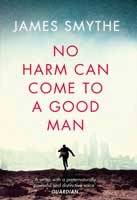
In space, no one can hear you lose your mind.
The first of Smythe’s Anomaly Quartet, this brief book completes its story in the first quarter, then invites you to follow it back around to find out what really happened, possibly. It’s a difficult structure to do well, and Smythe handles it.
This is the story of a group of intrepid adventurers who will go further into space than any human ever has and return. A carefully selected group of people begin their journey and – avoiding spoilers – things don’t tend to go as they’d expect.
Claustrophobic. Compelling. Intelligent. Get it.

 James Smythe writes deep, complex novels which are really rather good. The Testimony – which keeps being cheap or free on Kindle, so watch for it – gives us the perspectives of twenty-eight people when a voice starts to speak, like radio directly into most people’s brains. This affects the world on very macro and very micro scales. People die. People change. They believe more in God, or less. Smythe weaves these voices into a complex, layered tapestry to ask what it means to be human. It’s a silent book that sticks with you and resonated for days, or even weeks afterwards. Get it
James Smythe writes deep, complex novels which are really rather good. The Testimony – which keeps being cheap or free on Kindle, so watch for it – gives us the perspectives of twenty-eight people when a voice starts to speak, like radio directly into most people’s brains. This affects the world on very macro and very micro scales. People die. People change. They believe more in God, or less. Smythe weaves these voices into a complex, layered tapestry to ask what it means to be human. It’s a silent book that sticks with you and resonated for days, or even weeks afterwards. Get it 